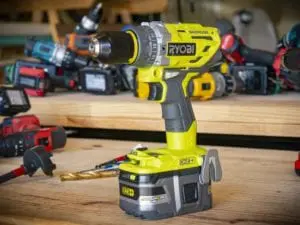Ryobi P251 Hammer Drill Makes Tough Drilling Look Easy at a Budget-Friendly Price
We’ve always appreciated the Ryobi ethos around here: make tools that actually get the job done without breaking your personal or business budget. Sometimes they outdo themselves with performance that holds its own against premium Pro brands. We wondered where the Ryobi P251 brushless hammer drill would fit in the broad range of Pro and DIY options. In the mix with 50 other drills, we learned a lot.
Shootout Results
The Ryobi P251 overcomes a hiccup in our torque test with impressive speed and efficiency, making it one of the best drills in our medium-duty class for tough drilling. That performance comes at the cost of a bulkier design. However, Ryobi stays true to form by sticking to a price that puts almost everyone else in the group to shame.
Overall, Ryobi’s brushless hammer drill is a fantastic choice to tackle nearly any DIY project that calls for a hammer drill and a low-cost option to keep your crews running at the Pro level.
Overall 18V Medium-Duty Drill Driver Ranking: 7th Place
Overall 18V Medium-Duty Hammer Drill Ranking: 6th Place
Features
The Ryobi P251 features a 2-speed brushless motor and an all-metal keyless 1/2″ chuck. We really like that Ryobi opts for a separate mode change switch from the clutch collar. It’s definitely a preference thing and it keeps us from having to rotate all the way around the clutch to get back to drill and hammer drill modes.
A belt hook, LED light, and magnetic bit and fastener holder round out the major features.
The auxiliary handle installs a bit different than most hammer drills. Instead of a completely separate clamping system that locks onto the collar, you screw the handle directly in just above the trigger. Some hammer drills go with a similar design but put the install point near the top.
Performance
Check out the details of how we test speed and torque on our Best Drill Head to Head Review main page.
Torque Testing
This Ryobi hammer drill moves into our medium-duty class (650—899 in-lbs) with 750 in-lbs of torque. It has one of the higher torque specs in the class—something we’re seeing more frequently from Ryobi’s brushless drills and impact drivers.
On our soft torque testing rig, the Ryobi P251 averaged 230.4 in-lbs of torque. Soft torque is much different than hard torque, so don’t give it too hard of a time for being that far under 750 in-lbs. The medium-duty group as a whole ranged from Ryobi’s 230.4 in-lbs to Kobalt’s 562.8 in-lbs, leaving Ryobi with work to do at the bottom.
We’re not throwing in the towel just yet, though. Brushless motors have electronics and several of our drills seems to protect the motor over cautiously on our rig. If that’s the case for Ryobi, we’ll see evidence of it in our speed testing.
Speed Testing
We tested Ryobi’s no-load speeds to give us a baseline to check it against. In high, it averaged 1763 RPM and in low, we saw 412 RPM. That’s the 2nd slowest speed in high and low. It should be no surprise if it is one of the slower models under load.
But when we tested it in high speed with a 1″ Bosch Daredevil High-Speed Auger Bit, the Ryobi P251 finished in 2nd place. It averaged 1424 RPM, drilling faster than Bosch, Hilti, Milwaukee, and Festool. Only Skil’s 20V brushless model managed a faster average. At 81% of its no-load speed, Ryobi also had the most efficient effort in its class.
With a 2-9/16″ Milwaukee SwitchBlade Self-Feed Bit, it finished in 4th place, averaging 401 RPM and an incredible 97% efficiency.
When it came to drilling into concrete, the Ryobi hammer drill was able to drill down 3″ with an average speed of 6.23 seconds using a 1/4″ Bosch Daredevil MultiPurpose Bit. This was a 4th place finish, but everything was pretty close between the 3rd and 6th place finishers. Festool crushed the group with a 4.36-second average while Hilti brought up the rear at 9.58 seconds.
Performance Takeaways
Both wood tests are in glued up OSB subfloor because of its consistency and make for a pretty aggressive test that’s tougher than untreated lumber. Ryobi’s efficiency ratings of 81% and 97% lead us to a couple of conclusions. First of all, it didn’t just lead the class, it put up efficiency numbers close to some elite finishers overall.
Secondly, it shows us that Ryobi is capable of much larger diameter bits in both speeds. By gearing the motor with slower no-load speeds, the design team gives the drill the capability to work with a wide range of bits, keeping you in high speed longer than some of its competitors. Read more about the relationship between speed, torque, and gearing here.
Given how well it performed under load, I’d have to say that its performance in our torque test isn’t a great indicator of how much working power it has with a bit in its chuck.
Size and Weight

It’s also the heaviest, weighing 5.24 pounds. Part of that is due to the advanced 6.0Ah battery we used in our testing. The kit comes with a standard 4.0Ah battery that’s a bit lighter.
None of this is a surprise to us. Ryobi tends to be bulkier on its tools that have performance levels competing in the Pro sector. It’s the trade-off you need to consider against its budget-friendly price.
Price
You can snag the Ryobi P251 as a kit with a charger and 4.0Ah battery for $129 at Home Depot. There’s no bare tool currently and you can find the kit under model Ryobi P1813.
Only Kobalt’s 24V model comes in lower ($99 drill driver kit), but they don’t have a hammer drill only kit. The next closest kit price is Skil’s HD529501 at $200. That’s a pretty solid value, especially when you consider how many tools and products work with a Ryobi 18V One+ battery!
The Bottom Line
The Ryobi P251 overcomes a hiccup in our torque test with impressive speed and efficiency, making it one of the best drills in our medium-duty class for tough drilling. That performance comes at the cost of a bulkier design. However, Ryobi stays true to form by sticking to a price that puts almost everyone else in the group to shame.
Overall, Ryobi’s brushless hammer drill is a fantastic choice to tackle nearly any DIY project that calls for a hammer drill and a low-cost option to keep your crews running at the Pro level.
Ryobi P251 18V One+ Brushless Hammer Drill Specs
- Model Number: Ryobi P251
- Depth: 8″
- Height: 8.125″
- Width: 3.375″
- Max Speed: 1,800 RPM
- Blows Per Minute: 24,000 BPM
- Motor Type: Brushless
- Chuck Size: 1/2″ Keyless
- Warranty: 3-Year
- Price: $129








